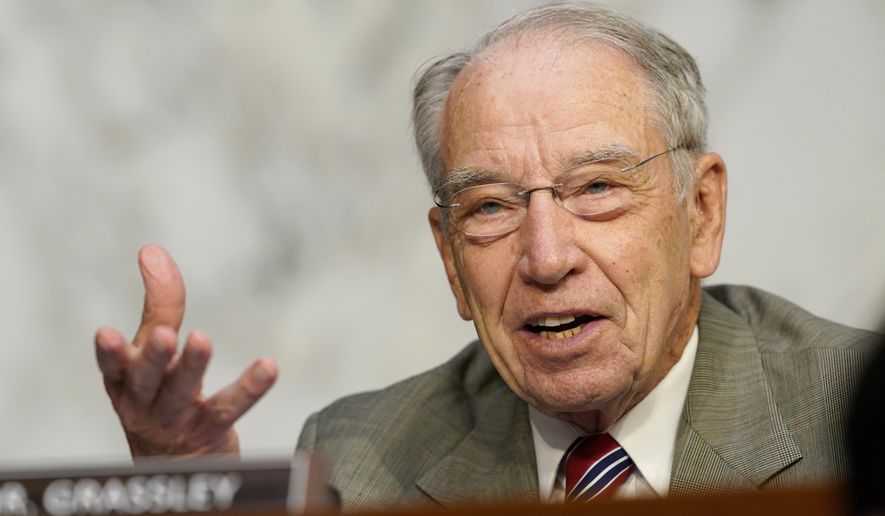Sen. Charles E. Grassley, Iowa Republican, is raising concerns about the Secret Service’s ability to manage resources after learning from whistleblower disclosures that the agency has not adequately reimbursed Homeland Security Investigations agents deployed to assist its protective details.
The Secret Service allegedly ran out of money last month to pay back HSI for travel-related expenses its jump team agents incurred when supporting Secret Service protective details, according to the whistleblower disclosures provided to Mr. Grassley’s office.
The HSI jump teams provide additional personnel for the Secret Service to use on protective assignments when it doesn’t have enough of its own agents to deploy.
The Secret Service “neglected to transfer enough funds for HSI to reimburse its agents, calling into question the agency’s ability to manage federal resources and raising major concerns,” Mr. Grassley said in a statement. “Congress and the American people have witnessed too many Secret Service shortfalls in recent months — they deserve answers, and it’s Congress’ job to bring transparency and accountability.”
A Department of Homeland Security spokesperson reached for comment declined to address Mr. Grassley’s concerns directly.
“DHS responds to congressional correspondence directly via official channels, and the Department will continue to respond to congressional oversight,” the spokesperson said.
SPECIAL COVERAGE: Investigating Trump assassination attempts
The Secret Service has been using HSI agents to help with personnel shortages amid the high-tempo election season, including at former President Donald Trump’s July 13 campaign rally in Butler, Pennsylvania, where he was nearly assassinated.
The whistleblower disclosures Mr. Grassley’s office received include emails detailing the Secret Service’s failure to fully reimburse HSI.
One email dated Sept. 9 asked HSI agents not to submit travel authorizations at that time because only $33 was left to pay for such expenses.
While more money was added that month, an email dated Sept. 26 warned of another shortfall.
“Unfortunately, we had over $371,000 worth of Jump Team Authorizations Fail last night,” the email read. “There is only $3,331.36 left on the line. We will not receive more money for Jump Team this year.”
The person who sent the email, whose name was redacted, said HSI was working to see if extra funds for jump team expenses from the prior year could be made available sooner than the typical mid-November time frame so that HSI agents could get paid back for their out-of-pocket expenses more quickly.
Mr. Grassley sent a letter to Homeland Security Secretary Alejandro Mayorkas, Secret Service Acting Director Ronald Rowe, Immigration and Customs Enforcement Deputy Director Patrick J. Lechleitner and HSI Executive Associate Director Katrina W. Berger questioning whether Secret Service resources are being used efficiently and effectively.
The senator also included more information about the whistleblower disclosures, saying HSI agents “are effectively required to travel when their name is called to deploy” on the jump teams, often with short notice for trips that can last multiple weeks.
“The whistleblower disclosures further show that in some cases HSI agents have had to pay for their own travel expenses such as flights, food, rental cars, hotels and other incidentals, because HSI has delayed reimbursing agents for costs due to the Secret Service failing to transfer funds to HSI,” Mr. Grassley said.
The senator cited the emails his office received from the whistleblowers and welcomed the leaders to provide additional context.
If the whistleblower accounts are accurate, he said, DHS continuing to require HSI agents to go on jump team travel without sufficient funds to cover expenses would run afoul of the Anti-Deficiency Act, which prohibits federal agencies from creating or authorizing payments in excess of available funds.
“Moreover, it also raises serious concerns whether HSI agents are being directed to not accurately and truthfully report jump team travel on their time and attendance reports in violation of the law due to their official travel not being approved,” Mr. Grassley said.
He asked the leaders to answer several questions by Oct. 23 related to the whistleblower disclosures and provide records related to the deployment of HSI jump teams dating back to 2021.
Mr. Grassley’s concern about the Secret Service properly managing its resources extends beyond the HSI jump team expenses.
In the letter, he cited security failures amid the two assassination attempts on Mr. Trump and threats against him from Iran.
Mr. Grassley pointed to the Secret Service’s failure to secure the perimeter of Mr. Trump’s golf course on Sept. 15, allowing a gunman to perch outside for 12 hours before being spotted by an agent sweeping ahead of the former president as he moved through the course.
The agency not securing the perimeter in advance, “despite the multiple violent threats and actions made against” Mr. Trump, calls into question statements Mr. Rowe has made claiming the Secret Service’s protective methodologies work and are sound, the senator said.
“Further, while reports say that the Secret Service has taken steps to use its resources to increase protections for former President Trump, questions remain whether these resources are being used efficiently and effectively,” Mr. Grassley said.
• Lindsey McPherson can be reached at lmcpherson@washingtontimes.com.




Please read our comment policy before commenting.